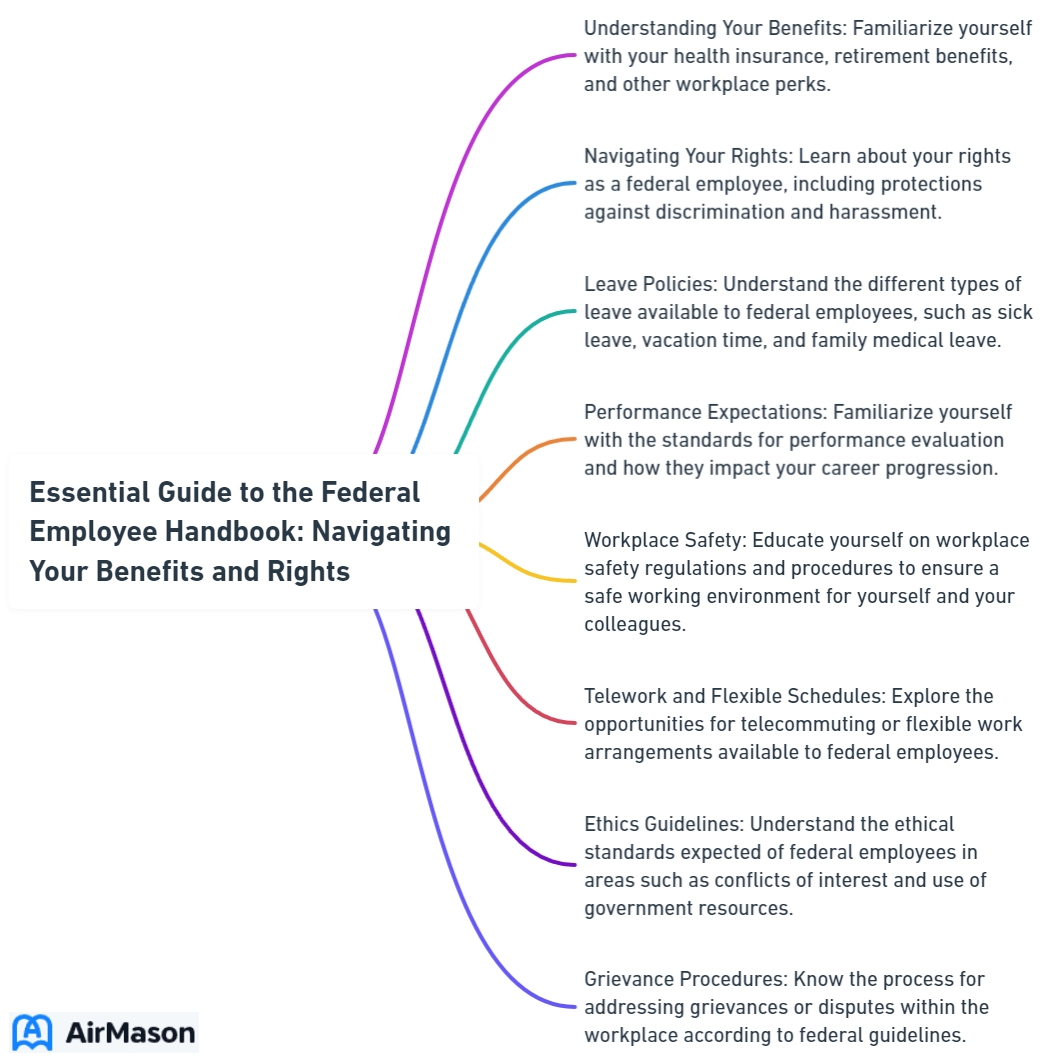
Looking for guidance on your federal employment? The Federal Employee Handbook is an essential tool that provides a comprehensive overview of your benefits, rights, and responsibilities. Without spoiling the detailed insights you’ll discover later, this article introduces the crucial elements you can expect to navigate, giving you the confidence needed as you serve the nation.
Key Takeaways
- The Federal Employee Handbook is an essential resource, providing guidelines on pay, benefits, performance management, and employee rights, aiming to ensure transparency and empower federal employees.
- Federal employment offers a variety of benefits, including a structured pay system, loan repayment assistance, comprehensive insurance options, leave benefits, FSAs, and support for retirement and survivor planning.
- Ethical conduct is paramount for federal employees, with the handbook outlining rules against conflicts of interest, misuse of position, and providing guidance on political activities, outside employment, and post-employment considerations.
Employee Handbook Rights
Employee handbook rights are essential for ensuring fair treatment and clear expectations in the workplace. These rights outline the parameters within which both employees and employers operate, covering areas such as employment conditions, company policies, and procedures. Employees have the right to access and review the handbook to understand their rights and responsibilities fully. Additionally, the handbook should detail procedures for dispute resolution, disciplinary actions, and employee grievances, providing a transparent framework for addressing issues. Employers must adhere to the commitments outlined in the handbook, ensuring that employees are treated fairly and in accordance with labor laws and company policies. Therefore, a well-crafted employee handbook serves as a crucial tool in promoting a positive work environment and fostering trust between employers and employees.
Understanding the Federal Employee Handbook

Your federal career journey can be navigated smoothly with the help of the Federal Employee Handbook. Think of it as a roadmap, assisting federal employees like you with clear directions on various policies, from your first day at work to your departure. It’s your one-stop-shop for understanding the intricate procedures and ethical standards of federal employment. Detailed sections on:
- pay
- benefits
- performance management
- employee rights
are designed to keep things transparent and straightforward.
However, the handbook goes beyond just rules and regulations. This handbook empowers federal employees by shedding light on their benefits, obligations, and rights. It’s a vital tool to navigate the complex terrain of federal employment, making sure you’re well-informed and equipped to make the best decisions for your career.
Federal Pay and Benefits
Moving on, pay and benefits are significant aspects of federal employment that merit discussion. The federal government provides the following assistance and benefits to not only support its employees but also assist federal agencies in maintaining a skilled workforce:
- The General Schedule (GS) pay system lays the groundwork for your base pay, with potential additional financial incentives for recruitment, retention, or performance excellence.
- Assistance with Federally-insured student loan repayments up to $10,000 per year.
- Eligibility for the Public Service Loan Forgiveness program upon meeting certain conditions.
In terms of benefits, the federal sector ensures comprehensive coverage. As a federal employee, you’re eligible for a suite of benefits including:
- 11 paid federal holidays
- Child care and commuter subsidies
- Comprehensive insurance options like health, dental, vision, life, and long-term care
- A new paid parental leave benefit for up to 12 weeks for Family and Medical Leave Act (FMLA) purposes
So, whether it’s the cost of your child’s braces or your commute to work, the federal government has got you covered!

Workplace Rights and Protections
Shifting gears, we now focus on another critical aspect of your federal career – workplace rights and protections. As a federal employee, you’re entitled to equal pay for equal work, adhering to federal employment discrimination laws that promote equal opportunities in the workplace, regardless of sexual orientation. The government also ensures you’re provided reasonable accommodations for disabilities and sincerely held religious beliefs, in accordance with legal requirements.
Moreover, your privacy is of utmost importance. Employers are required to maintain confidentiality of employees’ medical and genetic information, safeguarding your rights and protecting you against discrimination. By staying updated with the very latest critical information, you can rest assured that your rights and protections are firmly in place, allowing you to focus on what you do best – serving the nation.
Key Components of the Federal Employee Handbook

Having covered the basics, we will now delve into the key components of the Federal Employee Handbook. The handbook provides an in-depth look at:
- Workplace flexibilities
- Work-life programs
- Elder care
- Alternative work schedules
The Handbook on Human Resources Flexibilities and Authorities, for instance, provides an extensive list of flexibilities available to federal agencies to manage their workforce.
Comprehending these components can enhance your federal employment experience. They’re designed to accommodate the diverse needs of federal employees like you, offering a flexible and supportive working environment. From managing your work-life balance to navigating your career progression, the handbook has got you covered.
Employment and Performance Management
Employment and performance management play a crucial role in maintaining a high-functioning workforce in the federal sector. As a new recruit, you’ll undergo a probationary period, typically lasting one year from your appointment date. This gives you a chance to prove your mettle and adapt to the nuances of federal employment.
As you progress in your career, performance appraisals are conducted annually to evaluate your job performance and set goals for the next year. These appraisals are more than just a grading system; they’re a platform for continuous growth and development, ensuring your skills and abilities align with the evolving needs of your agency.
Leave Benefits and Flexible Spending Accounts
Recognizing that life isn’t just about work, the federal government offers various leave benefits. As a federal employee, you have access to a variety of leave benefits catering to different needs. These benefits include:
- Annual leave
- Sick leave
- Family and medical leave
- Provisions for military service
Plus, your non-federal work experience or uniformed service could even contribute to higher leave accrual rates.
And the benefits don’t stop there. To manage your out-of-pocket healthcare and dependent care expenses, you can utilize Flexible Spending Accounts (FSAs). These accounts allow you to allocate pre-tax dollars to cover eligible expenses, providing financial advantages and ensuring your hard-earned money is put to good use.
Retirement Planning and Survivor Benefits
Although retirement may seem distant, early planning is always beneficial. Understanding the Federal Employees Retirement System (FERS) is crucial. It can help you strategize your contributions to the Thrift Savings Plan (TSP), ensuring you’re financially secure in your golden years.
The handbook also provides information on survivor benefits, designed to offer financial security to your loved ones in the unfortunate event of your passing. These benefits include lump-sum payments and continuous monthly annuity payments, providing a safety net for your family. So, whether you’re just starting your career or nearing retirement, the handbook helps you plan for all stages of life.
Navigating Health Insurance Options

Healthcare, an essential part of your benefits package, offers several options that you need to understand. As a federal employee, you’re eligible for a wide range of health insurance options through the Federal Employees Health Benefits Program (FEHBP). From Fee-for-Service (FFS) plans to Consumer-Driven Health Plans (CDHP), you have the freedom to choose the best plan for your personal or family needs.
But it’s not just about choice; it’s about comprehensive coverage. Whether it’s preventive care, emergency services, maternity care, or prescription drug coverage, FEHBP ensures you’re covered. Remember, each plan comes with its policies and premiums, so make sure to weigh your options carefully.
Federal Employee Health Benefits Program
The Federal Employee Health Benefits Program (FEHBP) is at the heart of your health insurance options. As a federal employee, you have a selection of FEHB plans to choose from. And don’t worry, you’re not alone in this. The government provides informational materials to help you choose the plan that best meets your healthcare requirements.
Whether you’re enrolling in health plans provided by unions or employee organizations, or navigating the complexities of FEHB and Medicare coordination, the handbook is your trusted guide. So, whether you’re a young recruit or a seasoned veteran, the FEHBP ensures you and your family’s health needs are well taken care of.
Long-Term Care Insurance
Long-term care is often overlooked, but it’s a crucial aspect of your health coverage. The Federal Long Term Care Insurance Program (FLTCIP) offers comprehensive insurance, covering care in various settings from nursing homes to at-home care. It’s more than just insurance; it’s peace of mind.
What sets FLTCIP apart are its additional features. From respite care benefits to home modifications and caregiver training, it’s designed to provide customized services that cater to your unique needs. Plus, its premium stabilization feature acts as a financial safeguard, mitigating the possibility of future premium increases. So, you can rest easy knowing that your long-term care needs are in good hands.
Official Government Travel and Reimbursement

Next, we embark on the topic of official government travel and reimbursement. As a federal employee, your travel for official duties is governed by the Federal Travel Regulation (FTR). Whether you’re traveling by plane, train, or automobile, the FTR has guidelines that ensure your travel is cost-effective and in line with federal policies.
However, the focus is not only on travel but also on reimbursements. From per diem rates to mileage reimbursements for the use of privately owned vehicles, the government ensures your official travel expenses are covered. And don’t worry, there’s a whole system in place to ensure compliance with these regulations, with policy offices housed in the agency’s Office of Finance or Travel/Relocation Office.
Government Vehicles and Office Equipment
Strict rules are in place for the use of government vehicles and office equipment, not only for federal employees but also for law enforcement officers. Federal property must be protected and used only for authorized purposes to ensure conservation for official business. So, whether you’re driving a government vehicle or using office equipment, remember – these resources are for official use only.
However, it extends beyond usage to making wise choices. When arranging government transportation, you’re required to choose the most cost-effective option, rather than what’s most convenient for you. And remember, regardless of your rank or position, transportation rules are uniformly applied to all employees. So, let’s drive responsibly and use resources wisely!
Reporting and Determining Eligible Expenses
Next, we discuss the process of reporting and determining eligible expenses. This might seem like a daunting task, but the handbook simplifies it for you. Agencies must report all business and relocation travel as part of their Travel Reporting Information Profile (TRIP) in the GSA Travel Reporting Tool.
Additonally, specific reporting requirements exist for first-class and business-class travel, as well as for senior officials traveling on government aircraft. But remember, even if you have no such travel to report, you’re still required to submit a negative report in accordance with the procedures. So, keep those receipts handy and stay on top of your reporting duties!
Ethics and Conduct for Federal Employees

As a federal employee, your service extends beyond the government to the nation. And with great power comes great responsibility. Federal employees are expected to uphold loyalty to the Constitution, the laws, and ethical principles, prioritizing them over personal interests. It’s more than just a job; it’s a commitment to serve with integrity and honesty.
However, it goes beyond following rules to setting the right example. Federal employees must demonstrate a sincere commitment to their responsibilities, refraining from making unauthorized commitments on behalf of the government. Public office is a trust, and it must not be exploited for personal gain. So, let’s lead with integrity, and uphold the trust placed in us by the nation.
Conflict of Interest and Misuse of Position
Being a federal employee demands a careful balancing act, particularly regarding conflicts of interest and misuse of position. As a federal employee, you’re prohibited from holding financial interests that conflict with your duties. From accepting gifts to using government resources for personal gain, the rules are designed to prevent potential conflicts and ensure the integrity of government operations.
So, whether you’re negotiating future employment or considering outside activities, remember to weigh your actions against the ethical guidelines and personnel practices. Violating these could lead to disciplinary actions or even criminal prosecution.
Hence, remaining true to our oath and serving with integrity and honesty is essential.
Political Activities and Outside Employment
Navigating political activities and outside employment can be tricky for federal employees. While it’s natural to have political inclinations or seek outside employment, it’s important to remember the restrictions under the Hatch Act and other federal regulations.
As a federal employee, you must avoid outside employment or activities that conflict with your government responsibilities. And remember, all such employment must be pursued outside of official work hours and without using government resources. So, whether you’re campaigning for your favorite candidate or moonlighting as a consultant, make sure you’re in line with the rules and regulations.
Post-Employment Considerations and Restrictions
Transitioning from federal employment is a significant change, necessitating an understanding of post-employment considerations and restrictions. From negotiating future employment to adhering to post-employment bans, there are several factors to consider to prevent conflicts of interest.
So, whether you’re planning to move to the private sector or considering a career change, remember to navigate this transition with care. Keep in mind the guidelines provided by the Federal Employee Handbook, and ensure that your actions align with the ethical standards of your former role.
Negotiating Future Employment
While negotiating future employment, maintaining transparency and avoiding potential conflicts of interest is key. As a federal employee, especially those in the senior executive service, you’re required to notify your Deputy Designated Agency Ethics Official within three business days of commencement of negotiations or agreement for future employment or compensation post-government service.
Remember, it’s not just about notifying your agency; it’s also about disqualifying yourself from certain work-related matters that could pose conflicts of interest. So, as you embark on your next career journey, make sure to navigate this transition with integrity and honesty.
State of Missouri Employee Handbook
The State of Missouri Employee Handbook serves as a comprehensive guide for employees, outlining policies, procedures, and expectations within the workplace. This handbook covers various topics such as employee rights, benefits, conduct standards, and grievance procedures. It provides valuable information to help employees understand their roles and responsibilities while fostering a positive work environment. Additionally, the State of Missouri Employee Handbook ensures consistency and fairness in employee management practices across different departments and agencies. Employees are encouraged to familiarize themselves with the contents of the handbook to ensure compliance with state regulations and promote a harmonious workplace culture.
Post-Employment Bans and Restrictions
Post federal service, adherence to certain bans and restrictions is mandatory. These post-employment bans are designed to prevent potential conflicts of interest and ensure the integrity of government operations. Some of the bans and restrictions include:
- Lifetime bans on certain activities, such as representing a foreign government or lobbying on behalf of a foreign entity
- Two-year bans on communications with the government regarding specific matters and agencies that you were involved with during your federal service
- One-year bans on certain types of employment, such as working for a contractor that you had oversight over during your federal service
These bans aim to ensure a clean transition from your federal role and maintain public trust in the government.
While these restrictions might seem stringent, they’re crucial in upholding the public’s trust in the federal workforce. So, as you transition into a new phase of your career, remember to respect these bans and uphold the integrity of your former role in federal service.
Summary
In conclusion, the Federal Employee Handbook is an essential resource for every federal employee. From understanding your pay and benefits to navigating health insurance options, from maintaining ethical conduct to planning for retirement, the handbook guides you through every facet of federal employment. It’s more than just a guide; it’s your key to unlocking a successful and rewarding federal career. So, equip yourself with the knowledge in this handbook and set your path towards a fulfilling journey in serving the nation.
Frequently Asked Questions
What is the Federal Employee Handbook?
The Federal Employee Handbook is a comprehensive resource provided by the government to inform employees about their benefits, obligations, and rights, covering various aspects of federal employment, including pay, benefits, performance management, and employee rights.
What are some notable benefits for federal employees?
Federal employees receive several benefits such as paid federal holidays, comprehensive insurance options, child care and commuter subsidies, and up to 12 weeks of paid parental leave.
What are some post-employment considerations for federal employees?
Federal employees should negotiate future employment and comply with post-employment bans to prevent conflicts of interest when leaving federal employment.
What restrictions apply to political activities and outside employment for federal employees?
Federal employees are required to follow the restrictions outlined in the Hatch Act for political activities and obtain pre-approval for certain outside employment to avoid conflicts with their government responsibilities.
Important Disclaimer:
Please be aware that the content on this page has been generated by using artificial intelligence language models and may contain errors, inconsistencies, or outdated information. It is provided as-is without any warranties or guarantees of accuracy.
We strongly recommend using this content as a starting point for further research. We disclaim any liability for damages or losses resulting from the use or reliance on this content.